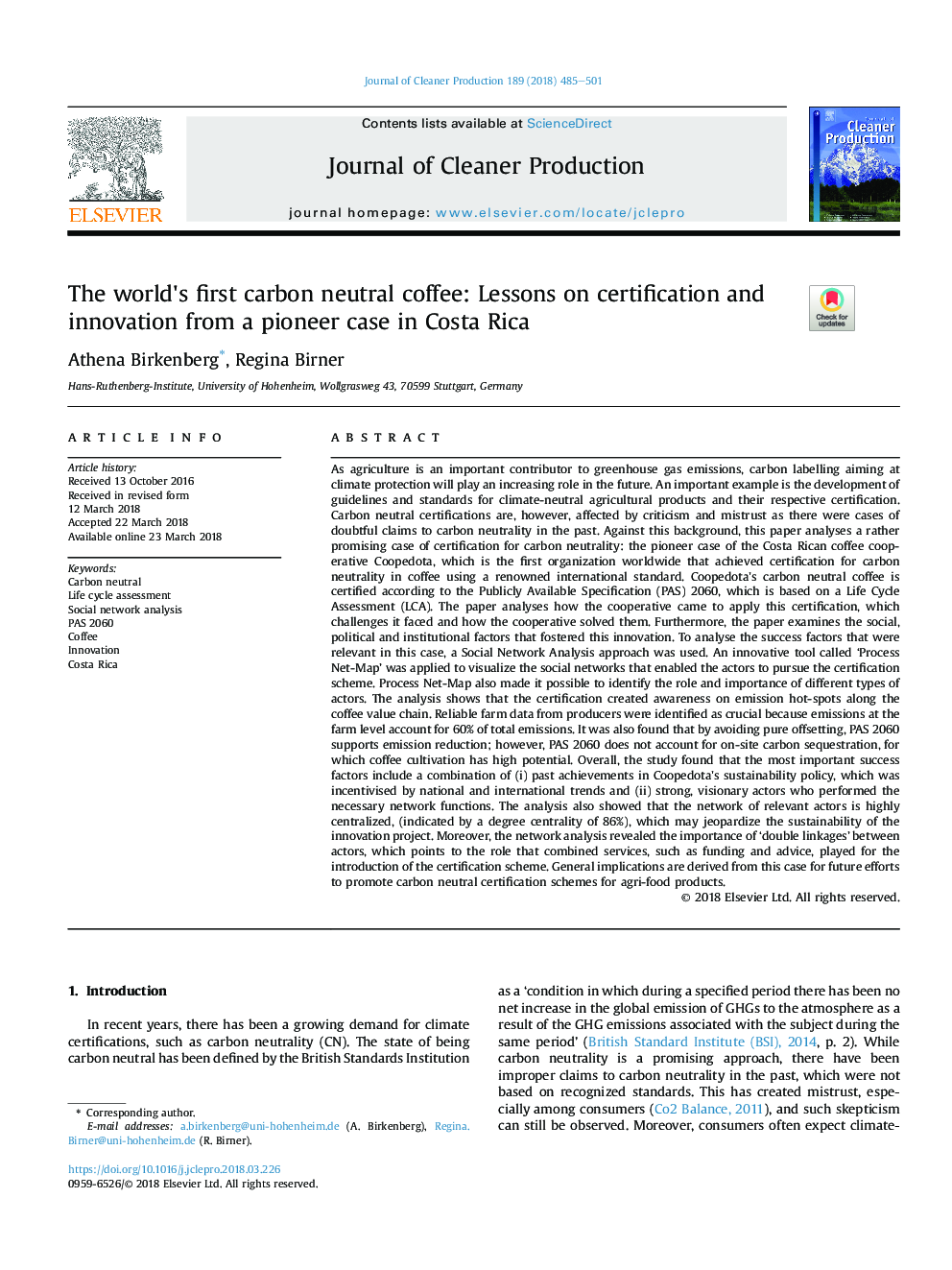| کد مقاله | کد نشریه | سال انتشار | مقاله انگلیسی | نسخه تمام متن |
|---|---|---|---|---|
| 8095184 | 1522064 | 2018 | 17 صفحه PDF | دانلود رایگان |
عنوان انگلیسی مقاله ISI
The world's first carbon neutral coffee: Lessons on certification and innovation from a pioneer case in Costa Rica
ترجمه فارسی عنوان
اولین قهوه کربن خنثی جهان: درس های گواهینامه و نوآوری از یک پیشگام در کاستاریکا
دانلود مقاله + سفارش ترجمه
دانلود مقاله ISI انگلیسی
رایگان برای ایرانیان
کلمات کلیدی
موضوعات مرتبط
مهندسی و علوم پایه
مهندسی انرژی
انرژی های تجدید پذیر، توسعه پایدار و محیط زیست
چکیده انگلیسی
As agriculture is an important contributor to greenhouse gas emissions, carbon labelling aiming at climate protection will play an increasing role in the future. An important example is the development of guidelines and standards for climate-neutral agricultural products and their respective certification. Carbon neutral certifications are, however, affected by criticism and mistrust as there were cases of doubtful claims to carbon neutrality in the past. Against this background, this paper analyses a rather promising case of certification for carbon neutrality: the pioneer case of the Costa Rican coffee cooperative Coopedota, which is the first organization worldwide that achieved certification for carbon neutrality in coffee using a renowned international standard. Coopedota's carbon neutral coffee is certified according to the Publicly Available Specification (PAS) 2060, which is based on a Life Cycle Assessment (LCA). The paper analyses how the cooperative came to apply this certification, which challenges it faced and how the cooperative solved them. Furthermore, the paper examines the social, political and institutional factors that fostered this innovation. To analyse the success factors that were relevant in this case, a Social Network Analysis approach was used. An innovative tool called 'Process Net-Map' was applied to visualize the social networks that enabled the actors to pursue the certification scheme. Process Net-Map also made it possible to identify the role and importance of different types of actors. The analysis shows that the certification created awareness on emission hot-spots along the coffee value chain. Reliable farm data from producers were identified as crucial because emissions at the farm level account for 60% of total emissions. It was also found that by avoiding pure offsetting, PAS 2060 supports emission reduction; however, PAS 2060 does not account for on-site carbon sequestration, for which coffee cultivation has high potential. Overall, the study found that the most important success factors include a combination of (i) past achievements in Coopedota's sustainability policy, which was incentivised by national and international trends and (ii) strong, visionary actors who performed the necessary network functions. The analysis also showed that the network of relevant actors is highly centralized, (indicated by a degree centrality of 86%), which may jeopardize the sustainability of the innovation project. Moreover, the network analysis revealed the importance of 'double linkages' between actors, which points to the role that combined services, such as funding and advice, played for the introduction of the certification scheme. General implications are derived from this case for future efforts to promote carbon neutral certification schemes for agri-food products.
ناشر
Database: Elsevier - ScienceDirect (ساینس دایرکت)
Journal: Journal of Cleaner Production - Volume 189, 10 July 2018, Pages 485-501
Journal: Journal of Cleaner Production - Volume 189, 10 July 2018, Pages 485-501
نویسندگان
Athena Birkenberg, Regina Birner,
